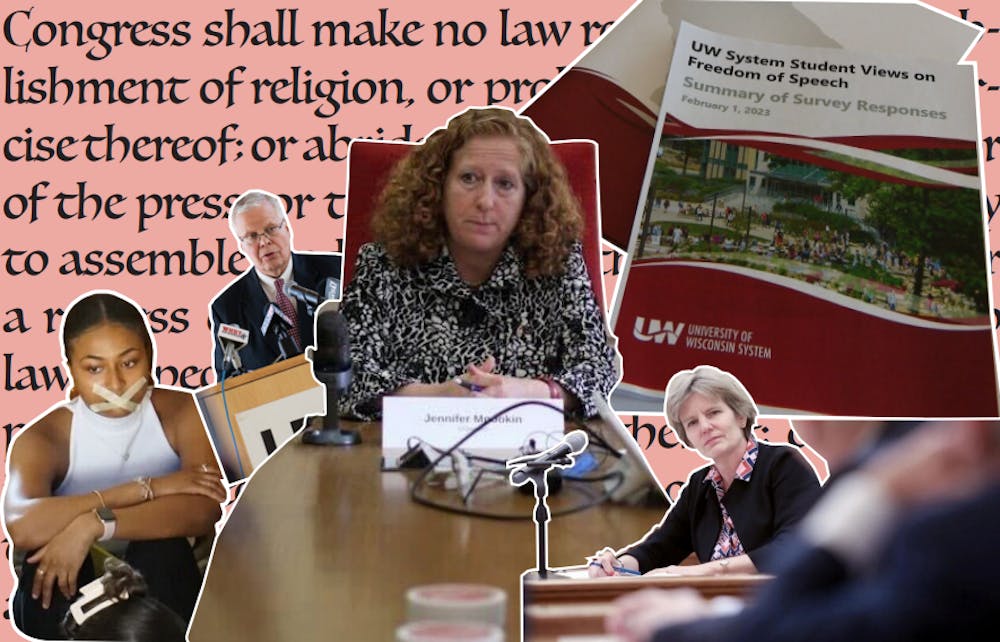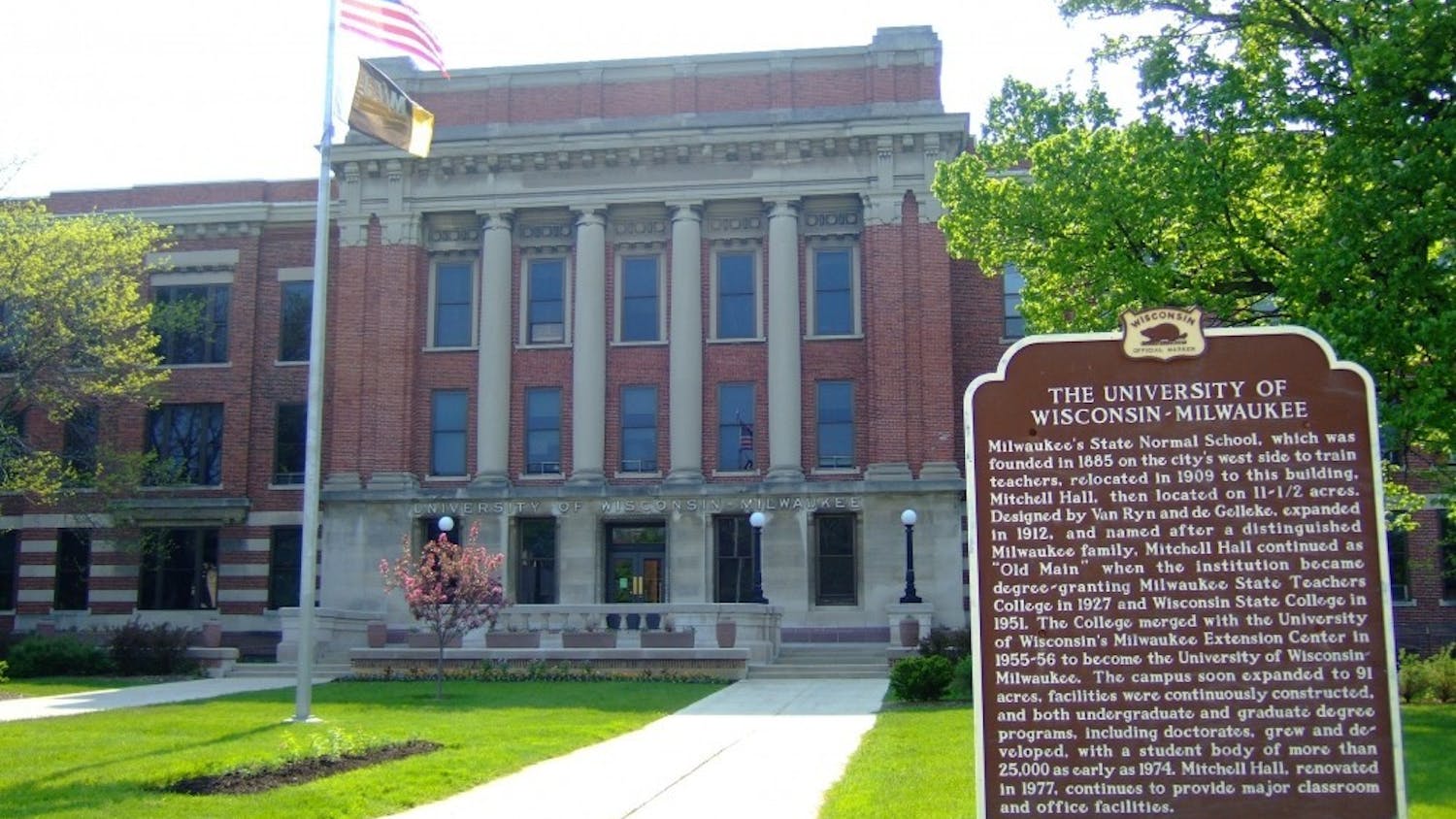A conundrum emerged across UW System campuses following the release of the Student Views on Freedom of Speech survey conducted in the fall of 2022.
In early April, Dr. Jacqueline Pfeffer Merrill, director of the Campus Free Expression task force at the Bipartisan Policy Center (BPC), urged members of the Wisconsin Assembly Committee on Colleges and Universities to consider the concern of free speech across college campuses.
Efforts by UW campuses to address free expression on college campuses have been marked by turbulent attempts to reconcile the emotional impact unrestricted speech, including hate speech, can have on students while attempting to uphold legal principles of the First Amendment.
At UW-Madison, for example, Chancellor Jennifer Mnookin and other campus leaders have faced challenges ensuring a welcoming campus for all students.
The presence of antisemitic graffiti and chalkings at UW-Madison during the first day of classes in fall of 2022 created student unease, something Mnookin acknowledged during a meeting last November with student media.
Still, she contended that the First Amendment — and all of its protections — applies directly to UW-Madison as it is a public university.
“One person’s hate speech is another person’s idea,” Mnookin explained, asserting the administration was not trying to “change anyone’s mind” but rather “help students understand they can learn from people who they disagree with.”
And in early May, a video circulated of a UW-Madison student saying racial slurs and violent remarks directed at Black people. This led to peaceful student demonstrations and town halls hosted across campus, including an Associated Students of Madison (ASM) forum where students shared dissatisfaction with the university’s response to the video.
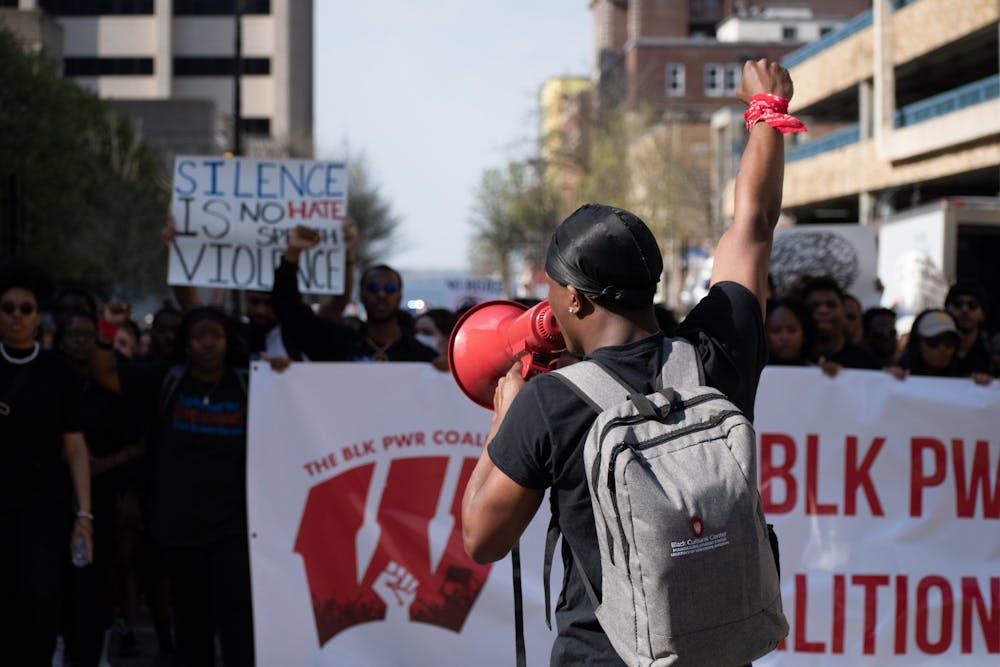
One of the leaders of the Blk Pwr Coalition guiding the protest down N Lake Street
Survey break-down
Timothy Sheil, a professor of English, philosophy and communication studies at UW-Stout, has been involved in free speech work on college campuses since the 1990s. He read the Bipartisan Policy Center's 2021 report, which recommended collecting college data on free speech, he told The Daily Cardinal.
In January, Sheil contacted UW-Stout faculty April Blusky Buczek and Eric Kasper to initiate the Student Views on Freedom of Speech survey across all 13 UW campuses to identify how student experiences with free expression influence self-censorship or classroom discussions. The survey was distributed late last year after student and faculty concerns stymied its initial planned rollout in April 2022.
The survey found 92% of students expressed their unfiltered views on a “controversial topic” because they knew enough about the topic. Similarly, 91% of students said it is because they cared about it or were encouraged to speak.
“Students reported the vast majority of their professors who teach controversial material are encouraging students to be involved in conversation and presenting different viewpoints,” Sheil said.
Still, the study found a significant gap in student perceptions of how welcome their opinions are in the classroom or other settings. A majority of “very liberal” (64%) and “somewhat liberal” (51%) students reported expressing their views on a controversial topic in class, compared to 42% and 35% of “very conservative” and “somewhat conservative” students, respectively.
Across various topics, Sheil said only 1 in 10 students reported they would be “extremely likely” to consider viewpoints they disagreed with.
Conservative students were more likely to perceive a negative response while speaking in class, according to the survey. But just 10% of students reported experiencing social consequences for speaking up about a topic. The nature of these consequences were not explored, according to Sheil.
“The further right, the more trends showed up — feeling like they would self-censor more, feeling like they might be being pressured to a point of view by the professor,” Sheil added. “These trends are showing up in virtually all these surveys being done by lots of different organizations.”
Merrill felt campuses should be a place where conservative students have conservative faculty in leadership roles.
“There's a real social consequence of being a self-identified conservative — how we think about that with peers, and addressing that with peers is a tough question,” Merrill said.
But Rep. Jodi Emerson, D-Eau Claire, disagreed with the Republican stance on self-censoring, sharing other reasons for its occurrence such as personal awareness and introversion.
“Self-censoring isn't not having free speech and free expression. Self-censoring, in my mind, is when you realize that other people have different viewpoints and you want to stop and think about how [your] comments are going to be received by this other person,” she said.
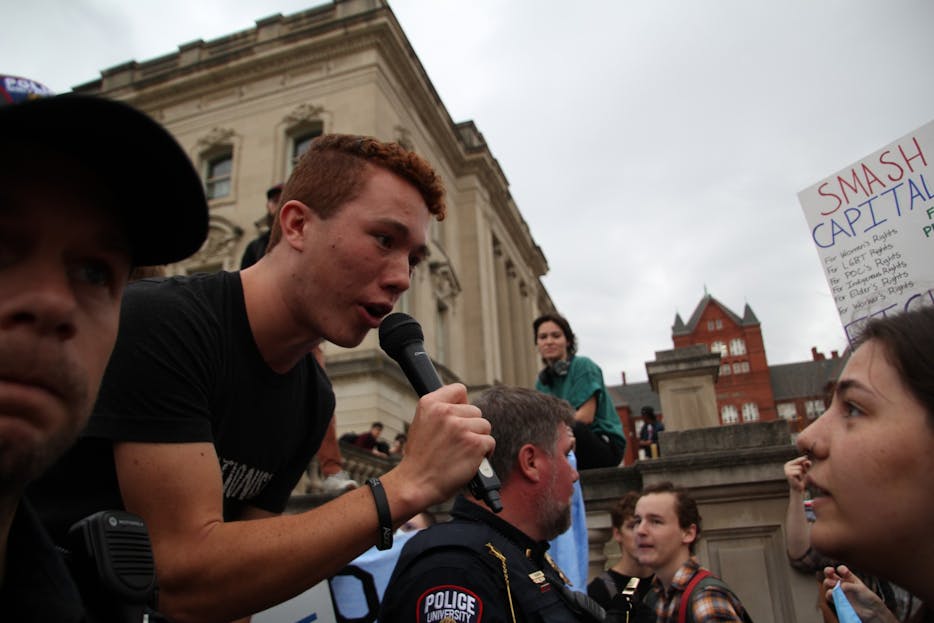
Assembly discourse
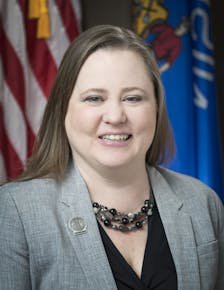
When the Wisconsin Assembly held its first discussion about the free speech survey results since they were published during a Committee on Colleges and Universities meeting in April, committee members attempted to merge expertise from Merrill’s task force with UW System survey results to aid campus expression.
“I have heard commentary over the last several years, including from my own recent employer, that some Gen Zers are coming in and have a lack of tolerance for different viewpoints,” Rep. Amanda Nedweski, R-Kenosha, said.
Committee chairman Rep. Dave Murphy, R-Appleton, further emphasized how nationwide student speech surveys and publicized events “highlighted a national trend towards the suppression of free speech.”
At the hearing, Merill emphasized four key takeaways her task force constructed to help universities facilitate freedom of expression. Although Merrill’s team found free expression is a “threatened value” at UW System campuses, system leaders had taken steps to foster a culture of free expression through curriculum and strengthen policies on academic freedom.
Merrill and the representatives said freedom of expression must be advocated for all students with varying political ideologies by implementing more conservative faculty.
“There's a limited pipeline of conservative professors,” Merrill explained. “I do think there are ways of doing more. To me, nobody should be hired [for their] political viewpoint.”
Emerson, who sits on the Assembly Committee on Colleges and Universities, disagreed. From her perspective, the issue isn’t that UW System campuses were excluding conservative student and faculty viewpoints— rather, she felt universities attracted a more left-leaning demographic brought up to prioritize higher education.
“People who are in the military tend to vote on the right side of the political ideology. Does that mean our military is indoctrinating them to be conservative? Or is it that the type of people who go into the military,” Emerson told The Daily Cardinal.

Understanding lawful language
UW campuses have become hotbeds for free speech skirmishes as debates over identity, belonging and expression play out in surveys and committees.
Standoffs were particularly volatile at UW-Madison, where visits from high-profile conservative speakers Matt Walsh and Ted Cruz provoked fierce responses from students who said their presence — in Walsh’s case, the presence of a self-described “theocratic fascist” — emboldens hateful rhetoric on campus.
Arguably the most notable incident to date occurred in early May, when a video of a UW-Madison student saying racial slurs and violent remarks directed toward Black people circulated around campus.
The video provoked widespread outrage from students, faculty and staff, including a demonstration where over 200 students peacefully marched across campus and presented Mnookin with a list of nine demands for university leaders.
Days after the video began circulating, Assembly Speaker Robin Vos announced his intention to eliminate diversity, equity and inclusion (DEI) officers at UW System campuses, stating universities have transformed into “institutes of indoctrination.”
DEI programs are in place to produce a safe environment for marginalized communities and expand enrollment demographics, according to UW-Madison’s diversity, equity and inclusion website.
In response to the video, one student said the racist language was “not just words,” but “a fucking threat.”

UW System President Jay Rothman told the Milwaukee Journal Sentinel in May that DEI offices are crucial to progressing students' interaction in a diverse workforce as well as improving retention and graduation rates.
The Assembly Committee on Colleges and Universities has not had a conversation on the circulated video of a UW-Madison student expressing racist language as of early June, according to Emerson.
“I don't think that the committee really should get involved in some of that stuff, because then we get to the point where we're micromanaging something that’s [for] individual campuses, Emerson said. “That's why we put people in charge.”
Emerson agreed with UW-Madison students that the video was “absolutely abhorrent.”
“When [she] said I'm going to hunt them down, that seems like dangerous rhetoric to me,” she added.
But Emerson was hesitant to say the student’s comments warranted expulsion, an action constitutional law experts and university officials maintain is not allowed under legal precedents governing free speech. A statement UW-Madison published in May said the school cannot restrict students and employees from posting to personal social media accounts, nor can they penalize such posts.
“Saying the n-word is despicable, but allowable,” Emerson said. “I don't know if I want to be in a country where we're micromanaging what comes out of everybody's mouth. That's [why] we need to defend everybody's right to say horrible, terrible things.”

Forward outlook
The UW System plans to launch the Wisconsin Institute for Citizenship and Civil Dialogue (WICCD), Rothman announced last November. It will be a system-staffed office with resources for all 13 campuses to learn how to encourage student participation in discussions and opposing views, according to Sheil.
“Maybe somebody at Oshkosh is doing something great and we just don't know about it. Let's find out, let's share that with the other campuses, and they can benefit from whatever that happens to be,” he said.
The UW System survey team recommended Assembly committee members develop methods for students to comfortably contribute any ideology in classroom discussions during an informational hearing in Eau Claire in April, according to Sheil.
Sheil emphasized that, at a public university, faculty cannot shut speakers or professors down. “We've got to use our own speech to combat their speech,” he said.
Additionally, Sheil told the Cardinal annual reports provided by the 13 campuses to the UW System do not indicate the campuses are imposing any “institutional consequences” despite more than a hundred students expressing they received an institutional consequence for constitutionally protected expression.
Regent Policy Document 4-21 requires annual campus reports to the UW System. UWSA then compiles the campus reports to the Board of Regents, according to Sheil. Students have the ability to file a bias incident report to a free speech committee run by the Board of Regents, according to RPD 4-21. The committee will do a “fact-checking” and see if their speech was protected, Sheil said.
“I was very surprised to see hundreds of students reporting institutional consequences for their expression,” he said. “One of the things [UW system is] supposed to provide [in] that report is whether there were any frequent violations or free speech discipline. Nobody ever reports any,” he added.
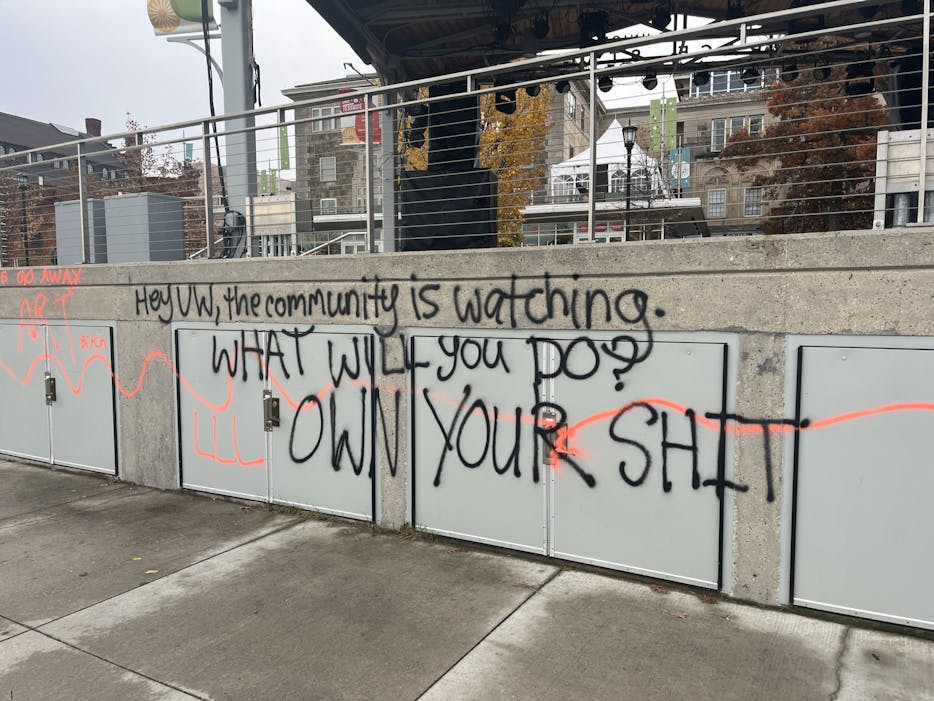
Campus-specific solutions
UW campuses have created their own projects to break down free speech barriers. UW-Eau Claire has held freedom of speech workshops on campus so students are knowledgeable about their First Amendment rights and can voice their opinions responsibly.
Some workshops are full-day affairs while others may last a few hours in the evening, according to an email statement from Eric Kasper, one of the UW-Stout faculty members who worked on the free speech survey.
“Most of them are open to all students, but we also have one type of workshop designed just for student government members. The general workshops involve some faculty instruction on the First Amendment, followed by students breaking into groups to discuss hypothetical situations,” the statement read.
Some of these hypotheticals include situations in which a public university punished or sanctioned someone for their opinion. Students then have to decide if the university’s response violated the First Amendment, according to Kasper.
Workshops for student government are focused on relevant decision-making, such as the allocation of student segregated fees, Kasper said.
In addition to the workshops, UW-Eau Claire created a 10-minute video shown to all students at orientation last fall to educate them on freedom of speech. The university also hosted a student reading group each semester, including books such as The Fight for Free Speech and Free Speech on Campus.
Sheil said campuses need the time and resources to take steps to address issues with the protection of free expression. It’s a long-term project that may require multiple years of work to reveal difficult conversations, he added.
“This is part of campus expectation. This is part of the value of the degree you're going to get,” Steil said. “You might be becoming an engineer, but it's still really important for you to understand how to have productive — not destructive — conversations with people you disagree with.”
Ava Menkes is the managing editor at The Daily Cardinal. She previously served as the state news editor. She has covered multiple stories about the upcoming election, healthcare and campus, and written in-depth about rural issues, legislative maps and youth voter turnout. She will be an incoming intern with Wisconsin Watch. Follow her on Twitter at @AvaMenkes.

